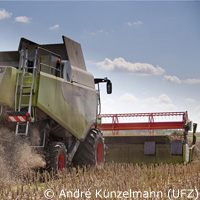Insecticide use to threaten European streams: study
Changes in the climate and the way we use land is playing havoc with our planet's ecosystem. The pressure is now on streams, as researchers in Germany predict that they will be more heavily polluted with insecticides than ever before. The study, presented in the journal Ecological Applications, highlights how the use of insecticides in agriculture will jeopardise the state of streams across Europe, especially in central Europe, and the Baltic and Nordic regions. The researchers established a link between the use of insecticides and temperature. Scientists at the Helmholtz Centre for Environmental Research (UFZ) compared the situation back in 1990 with predicted climate and land use change scenarios in 2090. Their estimates show, for instance, how agricultural pesticides will impact Germany negatively: large parts of the country will belong to the some 40% of the continent's surface area in which streams will no longer have a good ecological status. Meeting the EU Water Framework Directive (Directive 2000/60/EC) objectives of securing and maintaining a good chemical and ecological status for all waters will be no easy task, according to the researchers. So the team believes it is important that streams' exposure to pesticides is greatly reduced. Not only would cutting pesticide use help drive this effort, but establishing buffer zones along the streams would contribute as well. Doing so will cut the volume of pesticides that are washed by rain from the fields into rivers. The researchers consider these buffer zones to be a refuge for threatened species, from where they can recolonise. For the purposes of their study, the Helmholtz team assessed the amount of insecticides used, the plant species cultivated and land use, and they visualised the results in maps. They then compared the baseline situation of more than 20 years ago with a climate scenario for 2090. 'For the expected climate changes, we took those values which the Intergovernmental Panel on Climate Change (IPCC) published in 2007 as the so-called A1B scenario,' says Dr Matthias Liess of the UFZ. 'At that time this was a worst-case scenario, with the world's average temperature expected to rise by 2.8 ° Celsius by the end of the 21st century. Many scientists now believe that the actual temperature rise might be well above this. If CO2 emissions and as a result the temperature rise are higher, the ecological risks for streams will also increase faster and the expected pollution levels will be reached much sooner.' Only a small number of studies have probed the effect of climate change on the ecological risks of pesticides for water life on large spatial scales. The researchers predict a 23-fold rise in the use of insecticides in Europe, depending on the degree of the rise in temperature and the assumed land use changes. An association between insecticide use and temperature exists. Climate changes will trigger a jump in the rate of development of insects and the rate of survival in winter. The team also estimates that improved development conditions will trigger an increased spread of insects. So the more heat a region feels, the greater the number of insecticides to be used. 'We concentrated on insecticides in this study because invertebrates are affected much more by these than by other groups of pesticides,' explains Dr Mira Kattwinkel of the UFZ, the lead author of the study.For more information, please visit: Helmholtz Centre for Environmental Research (UFZ):http://www.ufz.de/index.php?en=11382Ecological Applications:http://www.esajournals.org/loi/ecap
Countries
Germany



